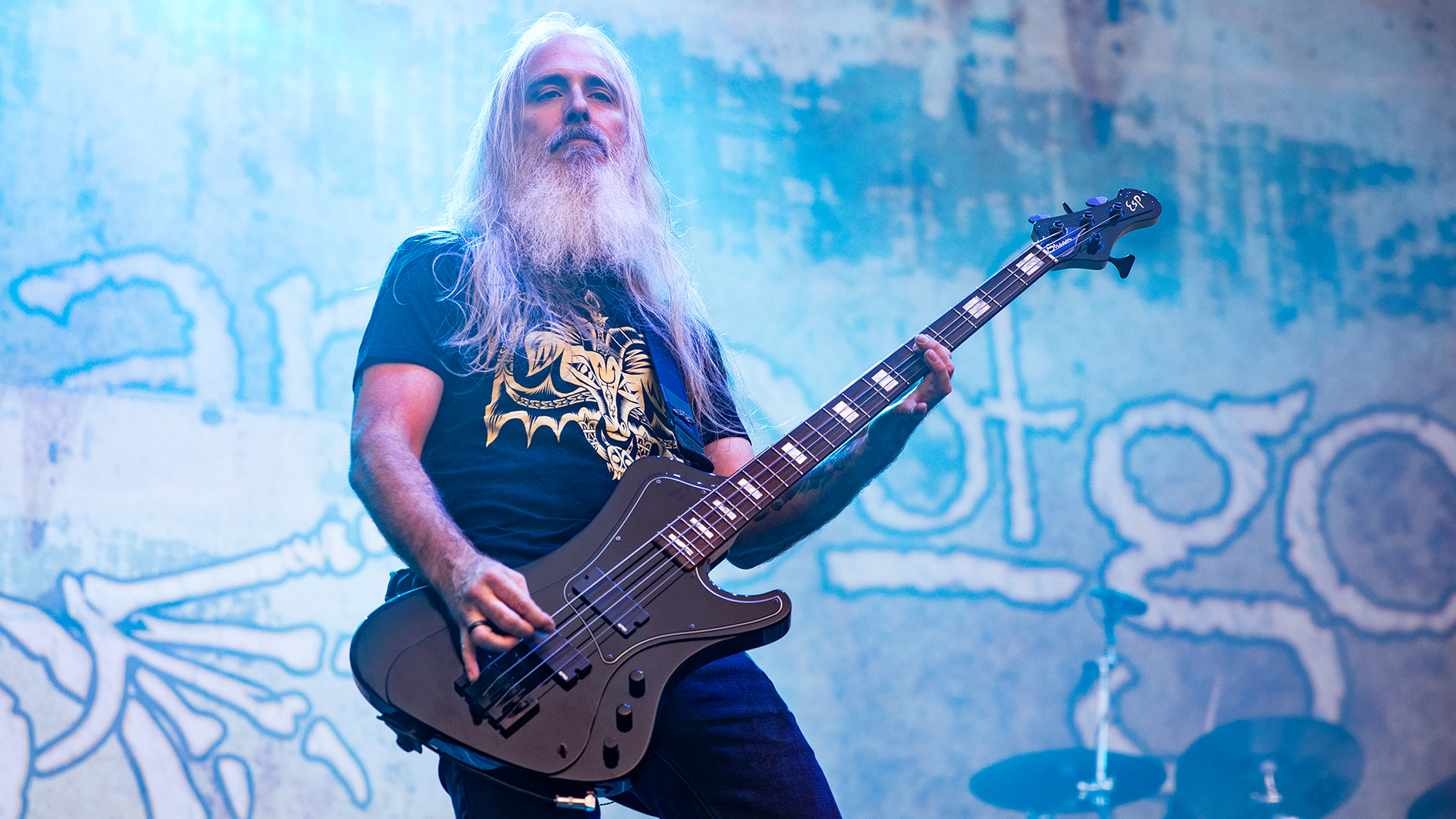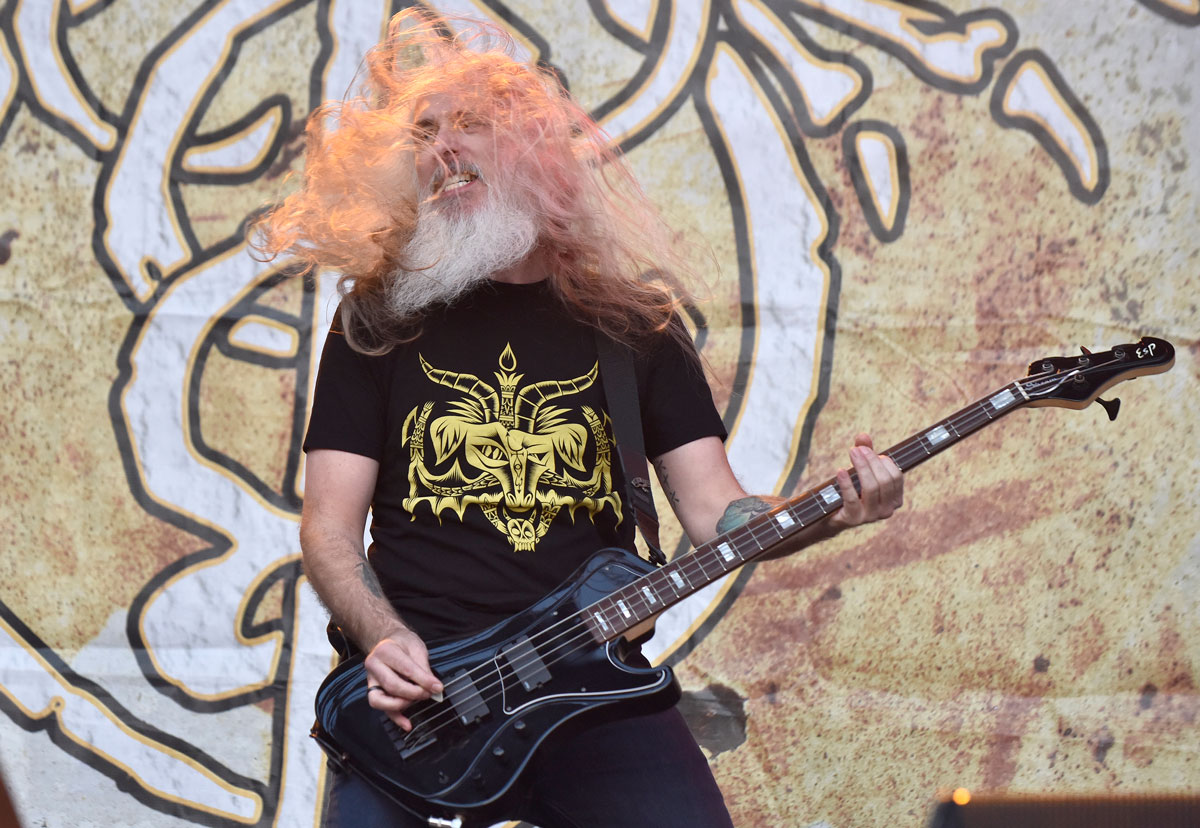Lamb of God's John Campbell: "People ask how I play so fast - I don’t really know because I made it up as I went along!"
The metal titan gives his advice on how to be a better bass player

"We’re losing work left and right,” sighs Lamb Of God bassist John Campbell. "Obviously people’s health is way more important than us playing some shows, but I’ll be very ready to get back out once that time comes.
"I imagine that people who are sitting at home quarantined are going to be ready to hear some live music too!"
The small matter of the pandemic aside, Campbell and his band are on fine form. Their new album, a self-titled effort indicating that it’s something of a career milestone, is a thoroughly enjoyable slab of riffage; we have no idea how Campbell, a pick player, keeps up with the intimidating picking speed of his guitarists Mark Morton and Willy Adler.
There’s also a new drummer, Art Cruz, of whom the bassist explains: “With Art playing, there’s this insane energy coming from behind the kit. This kid is living his dream, because Lamb Of God has been his favorite band since he decided he wanted to play drums, even though playing drums in our band is like sprinting a marathon every night."
So what advice has Campbell got for us on the subject of bass?

Warm up, and then warm up again.
"At this point I’m mostly a pick player, although I’ll play with my fingers when I’m just playing around at home or something. For what I do, I couldn’t play that accurately without a pick, so for me, preparing my hands for a live show means a lot of slow going through riffs and just building the neural networks.
Get The Pick Newsletter
All the latest guitar news, interviews, lessons, reviews, deals and more, direct to your inbox!
"People ask how I play so fast, but I don’t really know how I do it because I kinda made it up as I went along. For me, a heavily-scored pick just sits in my hand like it’s nothing. I’m not saying that simple, Van Halen-style bass is boring, because there’s little twists and tricks in there and that’s cool, but maybe I’m too impatient to sit and ride that.
"It’s like I’m thinking ‘That’s a cool riff, I want to play that riff, too!’ I’m lucky enough that it’s my job to play that way, and I invest a lot of time into it. It’s really about the passion you have to spend the time, and burn through the times that are not fun, when you’re playing the same thing over and over again, building up speed and still messing it up.
Early on in a tour, I’m definitely gonna spend an hour at least playing, sometimes playing chromatically up and down, just to get things right
"You’ve got to still want that, and you’ve got to keep pushing yourself. I’m incredibly happy where I’m at, because we continue to put out our best work."
Accept that mistakes happen.
"Do I make mistakes? No, never. What are you talking about? Ha ha! No, of course I do, but that’s part of being able to do this - being able to roll with the punches. You have to set it up so that you’re punch-free when you get on stage or go to rehearse. You’re not drinking, you’re where you need to be and you’re focused on the performance.
"But yeah, mistakes happen all the time. Early on in a tour, I’m definitely gonna spend an hour at least playing, sometimes playing chromatically up and down, just to get things right. Two or three weeks into a tour, if we’re playing five nights a week, then 15 or 20 minutes before each show is enough.
Know the place of the bass
"Our band’s songwriting process has evolved over the years. Mark and Willy will demo stuff all day long in their home studios, so we’ll pick them apart. I’ll make suggestions in the process, sure, but as the years have gone on, the demos that they make are near-complete songs.
"This time our producer Josh Wilbur even got involved at demo stage, helping to shape and create the songs.
"There are bass parts on those demo songs, and sometimes I’ll replicate those if they’re playing the riff, but occasionally there are parts that are more open to interpretation.
"I might play an ascending scale behind them, for example. Generally I will pound out the riff with the guitars, but occasionally I’ll play along with a riff and accent something. If the riff changes key in the middle of it, maybe I’ll drop when the key changes to playing the root.
I love riffing, man, maybe to my detriment. I’ve spent a few years doing it, so it’s my normal
"But I love riffing, man, maybe to my detriment. I’ve spent a few years doing it, so it’s my normal."
Have faith in your bass gear
"I haven’t made any changes to my touring gear recently. I play my signature ESP bass, the rig is a Mesa 400+ head and a Mesa 8x10 cab, and I’ve been using an EBS compressor pedal. I also bounce back and forth between a Tech21 Sansamp and a Darkglass. I’m always a four-string player.
"We mostly use drop-D in Lamb Of God, but there’s a fair amount of drop-C# as well and some drop-C. I like to take out one bass per tuning and then a backup or two ready to go.
"My signature bass has got a lot of wood on it, it’s got some weight to it. You’ve got to trust your equipment - there’s nothing worse than going out ready for anything, including facing a big crowd, and then something doesn’t happen."
Don’t fear complex bass parts
"Our song Redneck, which we recorded in 2006 with the producer Gene ‘Machine’ Freeman, has a really difficult break in it. I said to him, ‘This part is cool, and it sounds great, but I can’t play it. There’s no way I can record that today, knowing that I’m going to play shows and I won’t be able to play this song. Go fuck yourself’.
"My attitude was that there are tricks you can use in the studio, but if you can’t play something live, it’s bullshit. You don’t go and record crazy stuff that you can’t do, just because the studio technology allows it.
"We got into a bit of an argument and he edited the part together with separate three-note sections, to show me what he wanted. In the end he made it clear that I just had to practice it and that I’d be able to play it eventually.
"He won the battle, and now it’s a fun part to play in the set. I just had to quit being scared of it and get on it."
Bass Player is the world’s most comprehensive, trusted and insightful bass publication for passionate bassists and active musicians of all ages. Whatever your ability, BP has the interviews, reviews and lessons that will make you a better bass player. We go behind the scenes with bass manufacturers, ask a stellar crew of bass players for their advice, and bring you insights into pretty much every style of bass playing that exists, from reggae to jazz to metal and beyond. The gear we review ranges from the affordable to the upmarket and we maximise the opportunity to evolve our playing with the best teachers on the planet.



![[from left] George Harrison with his Gretsch Country Gentleman, Norman Harris of Norman's Rare Guitars holds a gold-top Les Paul, John Fogerty with his legendary 1969 Rickenbacker](https://cdn.mos.cms.futurecdn.net/TuH3nuhn9etqjdn5sy4ntW.jpg)







